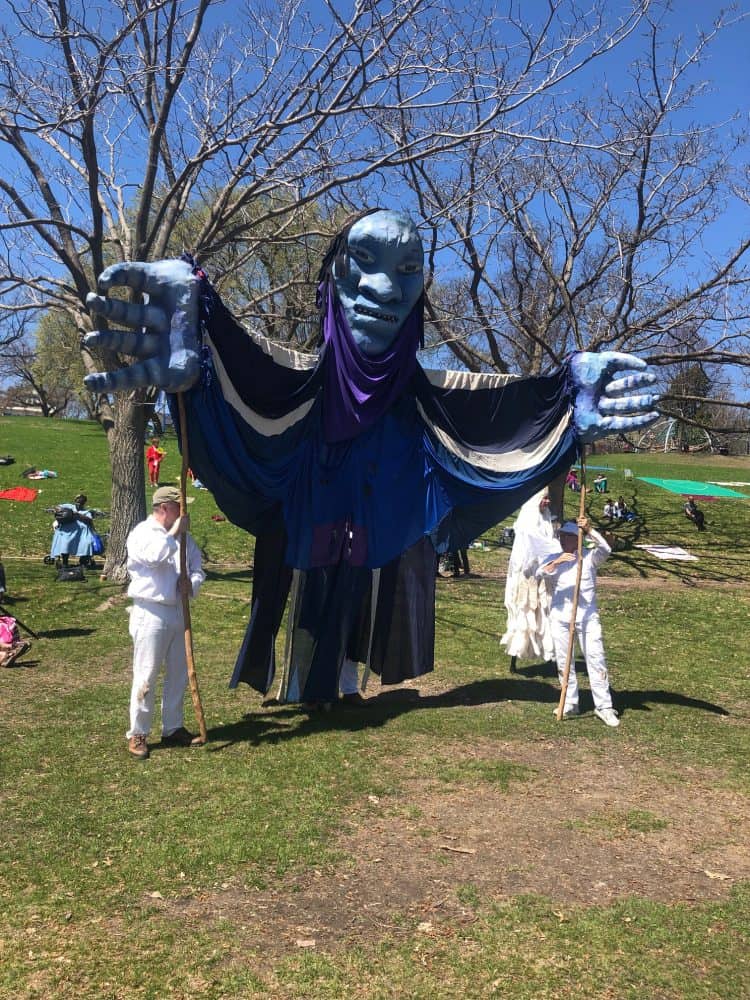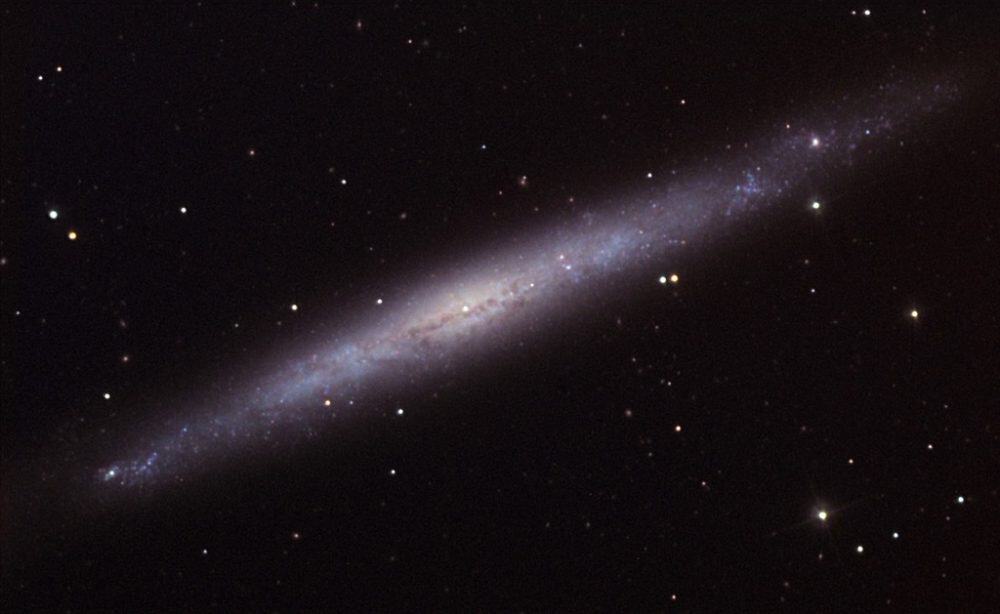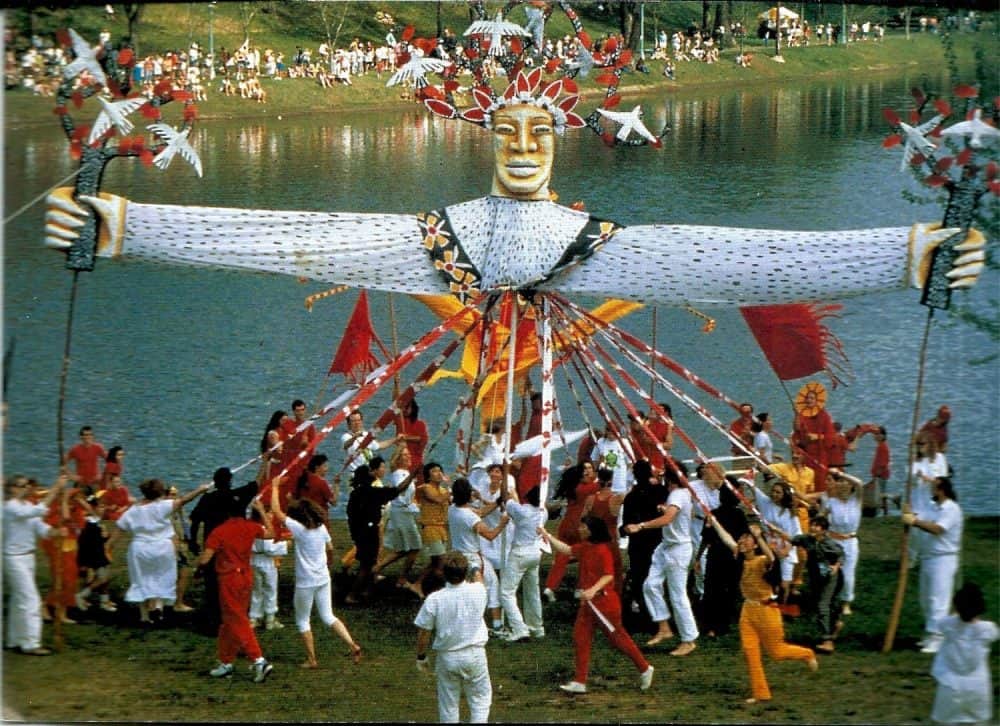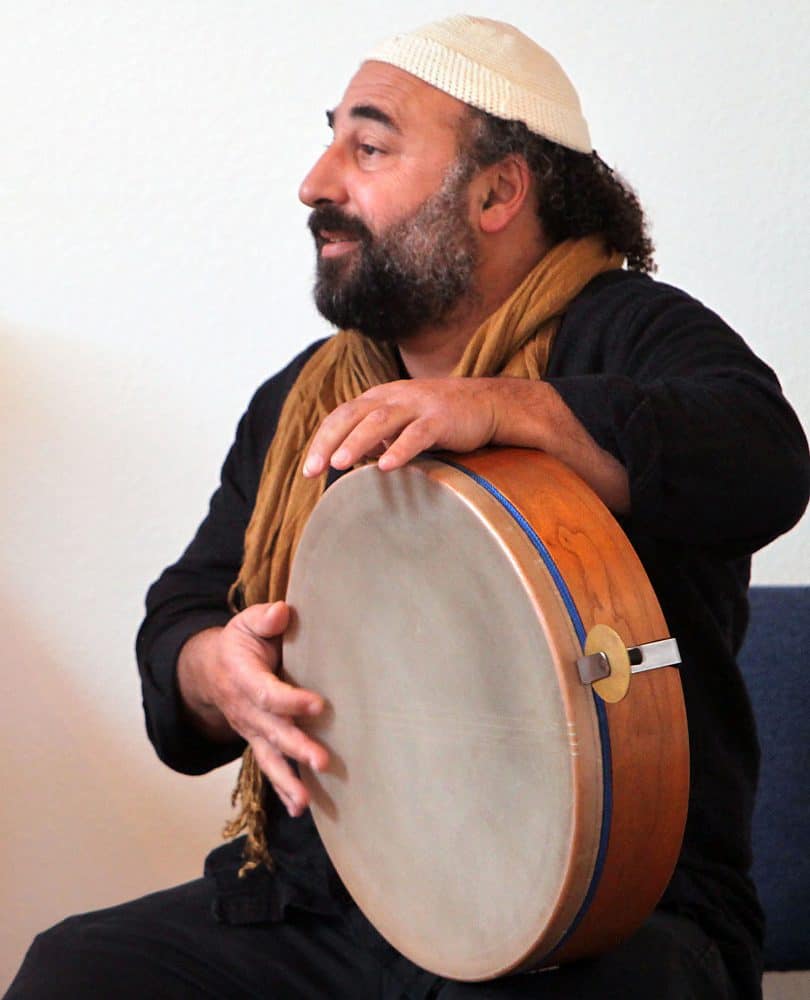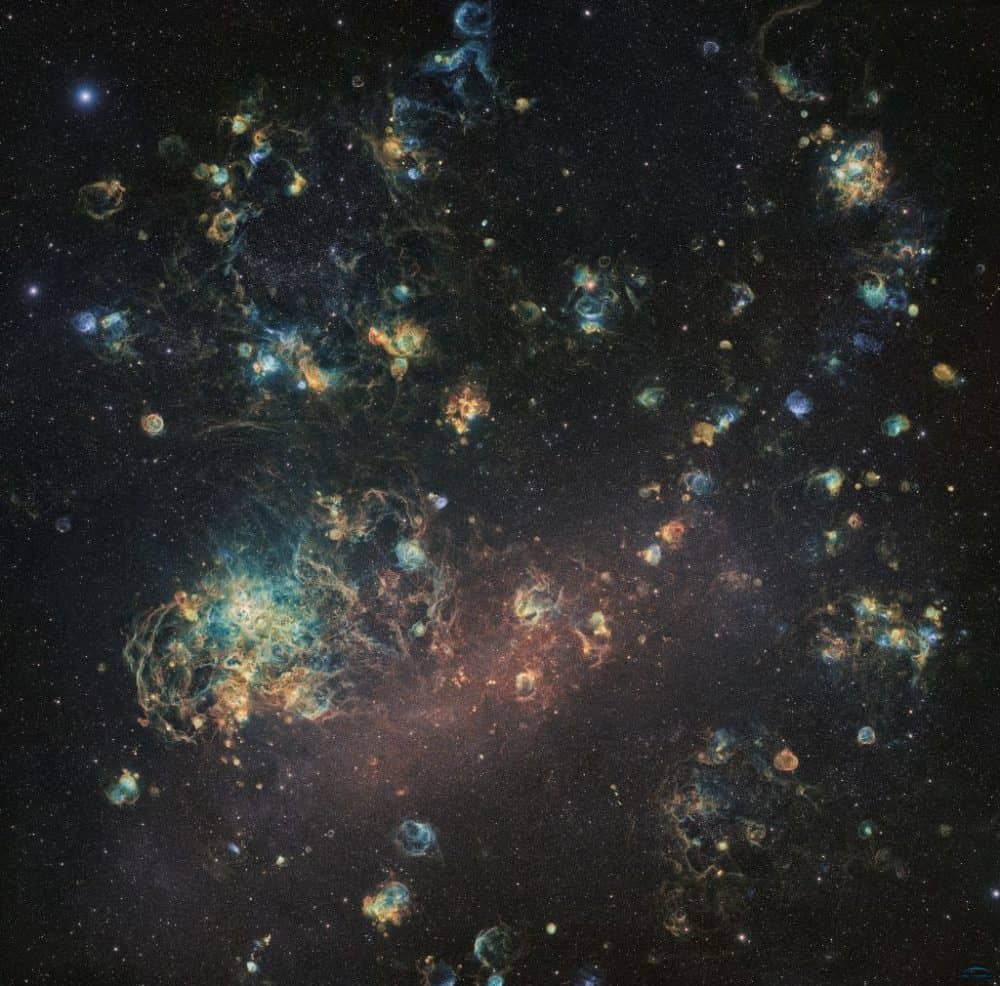Blog
mick will be conjuring up pure madness marching in the Parade with the Community Band starting at noon 25th and Bloomington So. Followed by the Ceremony Cue Director of the pageant performance of Beloved Community what I call the Wounded Ones with a full horn orchestra and rhythm section. Finally my New Orleans group BEAU KOO JACKS and POSITIVE VIBRATIONS performing on the grass of the Ceremony Site.
And the festivals director Sandy Spieler will be stepping down as director of Mayday and In the Heart of the Beast Puppet and Mask Theater.
more...
This magnitude 10.4 spiral measures a worthy 17′ by 2.2′. Its disk appears almost edge-on, tilting only 5° to our line of sight. Through the eyepiece, this galaxy’s core appears only slightly brighter than the rest. What sets the Silver Needle Galaxy apart, however, is its length-to-width ratio. View this object through a 4-inch scope, and you’ll understand why its name contains the word “needle.”
NGC 4244, also Caldwell 26, is an edge-on loose Spiral galaxy and Caldwell object in the constellation Canes Venatici. It is part of the M94 Group (the Canes Venatici I Group), a galaxy group relatively close to the Local Group containing the Milky Way. It shines at magnitude +10.2/+10.6. Its celestial cooridinates are RA 12h 17.5m, dec +37° 49′. It is located near a naked-eye G-class star Beta Canum Venaticorum, barred spiral galaxy NGC 4151, and irregular galaxy NGC 4214. The galaxy lies approximately 6.5 million/14 million light years away, with a redshift of +243/493 km/s. A nuclear star cluster and halo is located at the centre of this galaxy
more...
Adele Laurie Blue Adkins MBE (/əˈdɛl/; born 5 May 1988) is an English singer-songwriter. After graduating from the BRIT School in 2006, Adele signed a recording contract with XL Recordings. In 2007, she received the Brit Awards Critics’ Choice award and won the BBC Sound of 2008 poll. Her debut album, 19, was released in 2008 to commercial and critical success. It is certified eight times platinum in the UK, and three times platinum in the US. The album contains her first song, “Hometown Glory“, written when she was 16, which is based on her home suburb of West Norwood in London. An appearance she made on Saturday Night Live in late 2008, boosted her career in the US. At the 51st Grammy Awards in 2009, Adele received the awards for Best New Artist and Best Female Pop Vocal Performance.
Adele released her second studio album, 21, in 2011. The album was critically well received and surpassed the success of her debut, earning numerous awards in 2012, among them a record-tying six Grammy Awards, including Album of the Year; two Brit Awards, including British Album of the Year; and three American Music Awards, including Favorite Pop/Rock Album. The album has been certified 17 times platinum in the UK, and is overall the fourth best-selling album in the nation. In the US, it has held the top position longer than any album since 1985, and is certified diamond. The best-selling album worldwide of 2011 and 2012, 21 has sold over 31 million copies. The success of 21 earned Adele numerous mentions in the Guinness Book of World Records. She was the first female artist to simultaneously have two albums in the top five of the Billboard 200 and two singles in the top five of the Billboard Hot 100, as well as the first woman in the history of the Billboard Hot 100 to have three simultaneous top 10 singles as a lead artist, with “Rolling in the Deep“, “Someone Like You“, and “Set Fire to the Rain“, all of which also topped the chart. 21 is the longest-running number one album by a female solo artist in the history of the UK and US Album Charts.
In 2012, Adele released “Skyfall“, which she co-wrote and recorded for the James Bond film of the same name. The song won an Academy Award, a Grammy Award, and a Golden Globe for Best Original Song, as well as the Brit Award for British Single of the Year. After taking a three-year break, Adele released her third studio album, 25, in 2015. It became the year’s best-selling album and broke first-week sales records in the UK and US. 25 was her second album to be certified diamond in the US and earned her five Grammy Awards, including Album of the Year, and four Brit Awards, including British Album of the Year. The lead single, “Hello“, became the first song in the US to sell over one million digital copies within a week of its release. Her third concert tour, Adele Live 2016, visited Europe, North America and Oceania, and concluded with finale concerts at Wembley Stadium in late June 2017.[4]
In 2011, 2012, and 2016, Adele was named Artist of the Year by Billboard. At the 2012 and 2016 Ivor Novello Awards, Adele was named Songwriter of the Year by the British Academy of Songwriters, Composers, and Authors. In 2012, she was listed at number five on VH1‘s 100 Greatest Women in Music. Time magazine named her one of the most influential people in the world in 2012 and 2016. Her 2016–2017 tour, saw her break attendance records in a number of countries, including the UK, Australia, and the US. With sales of more than 100 million records, Adele is one of the world’s best-selling music artists.
https://www.youtube.com/watch?v=9OJnW2LbUw4
more...Faegheh Atashin (Persian: فائقه آتشین, born 5 May 1950), better known by her stage name Googoosh (Persian: گوگوش) is an Iranian singer and actress, and one of Iran’s most popular and enduring entertainers, whose career spans over 60 years. Googoosh was not only a popular singer since the beginning of her career, but by time she became a cultural icon, inside Iran and abroad. Today, Googoosh continues to appeal to a new generation of fans.
She is known for her contributions to Iranian pop music, but also starred in a variety of Persian movies from the 1950s to the 1970s. She achieved the pinnacle of her fame and success towards the end of the 1970s. In 1970s, Googoosh was widely emulated by Iranian women, as they copied her clothing (miniskirts) and her short haircut (known as the “Googooshy”).Following the Iranian Revolution in 1979, she is famously known for remaining in Tehran until 2000 and not performing again due to the ban on female singers. Still, her following grew. Younger Iranian people have rediscovered her music via bootleg recordings. After leaving Iran in 2000, she performed a total of 27 concerts in European and North American countries in that year. Recent projects include a new collaboration with singer/songwriter Hassan Shamaizadeh from her 2012 album Ejaz, as well as serving as head judge and head of academy for the popular reality show Googoosh Music Academy which is broadcast on London based satellite channel Manoto 1.
Since her return to the stage in the summer of 2000, she has performed concerts all around the world, including some of the biggest and most prestigious venues in the world like Madison Square Garden in New York, Air Canada Centre in Toronto, The Royal Albert Hall in London. She has recorded songs in multiple languages such as Persian, Azerbaijani, Turkish, English, Spanish, Italian, Arabic, Armenian and French. Outside of Iran, she has a significant following in many other Middle Eastern as well as Central Asian countries, and has even caught the attention of European and African media and press. Her overall impact and contributions to Iranian pop music, made her the most iconic female pop singer in the Persian speaking world.
https://www.youtube.com/watch?v=VYTgfcVwXKg
more...Stanley Cowell (born May 5, 1941) is an American jazz pianist and co-founder of the Strata-East Records label. Cowell was born in Toledo, Ohio. He began playing the piano at around the age of four, “and first became interested in jazz after gaining exposure to the music of pianist Art Tatum, a family friend”. “After high school, he attended both the Oberlin College Conservatory and the University of Michigan, during which time he also gained valuable experience playing with Rahsaan Roland Kirk“.[1] He moved to New York in the mid-1960s.
Cowell played with Marion Brown, Max Roach, Bobby Hutcherson, Clifford Jordan, Harold Land, Sonny Rollins and Stan Getz. Cowell played with trumpeter Charles Moore and others in the Detroit Artist’s Workshop Jazz Ensemble in 1965–66. During the late 1980s Cowell was part of a regular quartet led by J.J. Johnson. Cowell taught in the Music Department of the Mason Gross School of the Arts at Rutgers, the State University of New Jersey.
more...Swimming through a group of galaxies more than 200 million light-years away from Earth is the so-called “jellyfish” galaxy named ESO 137-001. This celestial jellyfish is a spiral galaxy much like the Milky Way, but it has long “tentacles” of hot gas streaming away from the galactic disk. Scientists aren’t sure how the gas is being stripped away, but NASA’s James Webb Space Telescope may be able to shed some light on the origin of those tentacles by studying them in unprecedented detail after its planned launch in 2021. This view combines visible-light imagery from the Hubble Space Telescope and X-ray data from the Chandra X-ray Observatory.
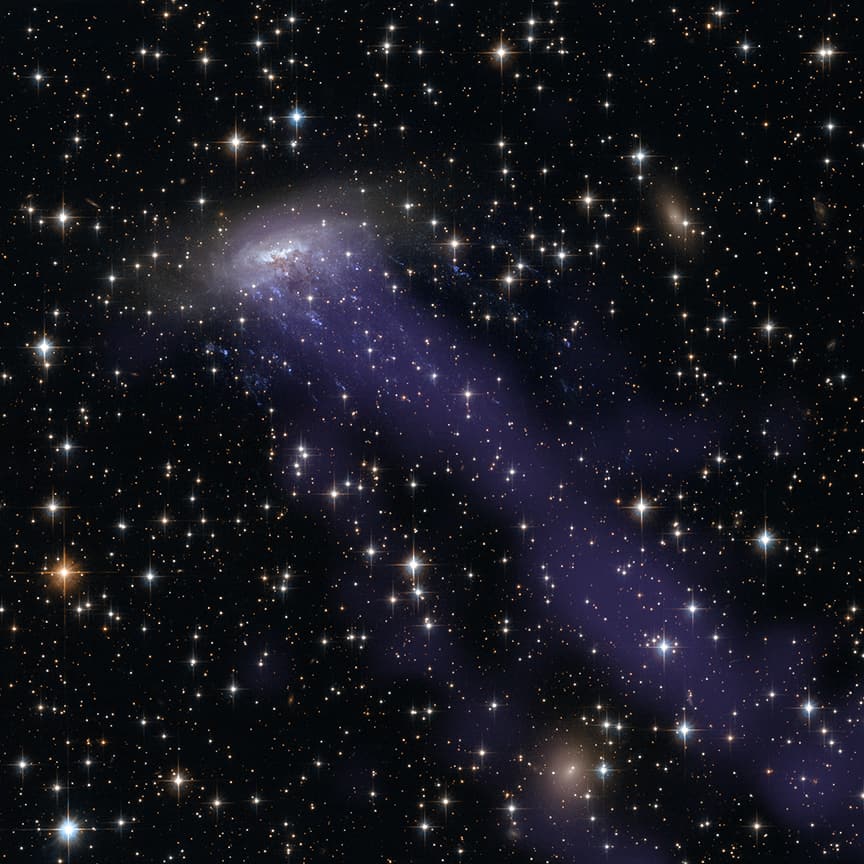
This image combines NASA/ESA Hubble Space Telescope observations with data from the Chandra X-ray Observatory. As well as the electric blue ram pressure stripping streaks seen emanating from ESO 137-001, a giant gas stream can be seen extending towards the bottom of the frame, only visible in the X-ray part of the spectrum.
more...
Ronald Levin Carter (born May 4, 1937) is an American jazz double bassist. His appearances on 2,221 recording sessions make him the most-recorded jazz bassist in history.
Carter is also a cellist who has recorded numerous times on that instrument. Some of his studio albums as a leader include: Blues Farm (1973); All Blues (1973); Spanish Blue (1974); Anything Goes (1975); Yellow & Green (1976); Pastels (1976); Piccolo (1977); Third Plane (1977); Peg Leg (1978); and A Song for You (1978). He was a member of the Miles Davis Quintet in the mid 1960s, which also included Herbie Hancock, Wayne Shorter and drummer Tony Williams. Carter joined Davis’s group in 1963, appearing on the album Seven Steps to Heaven and the follow-up E.S.P.. Carter also performed on some of Hancock, Williams and Shorter’s recordings during the sixties for Blue Note Records. He was a sideman on many Blue Note recordings of the era, playing with Sam Rivers, Freddie Hubbard, Duke Pearson, Lee Morgan, McCoy Tyner, Andrew Hill, Horace Silver and many others. He was elected to the Down Beat Jazz Hall of Fame in 2012. In 1993, he won a Grammy Award for Best Jazz Instrumental Group and another Grammy in 1998 for “an instrumental composition for the film” Round Midnight. In 2010 he was honored with France’s premier cultural award, the medallion and title of Commander of the Ordre des Arts et des Lettres.
His first jobs as a jazz musician were playing bass with Jaki Byard and Chico Hamilton. His first records were made with Eric Dolphy (another former member of Hamilton’s group) and Don Ellis, in 1960. His own first date as leader, Where?, with Eric Dolphy, Charlie Persip, Mal Waldron, George Duvivier, and a date also with Dolphy called Out There with George Duvivier and Roy Haynes and Carter on cello; its advanced harmonies and concepts were in step with the third stream movement.
Carter came to fame via the second Miles Davis Quintet in the mid 1960s, which also included Herbie Hancock, Wayne Shorter and drummer Tony Williams. Carter joined Davis’s group in 1963, appearing on the album Seven Steps to Heaven and the follow-up E.S.P., the latter being the first album to feature only the full quintet. It also featured three of Carter’s compositions (the only time he contributed compositions to Davis’s group).
more...Richard Anthony Monsour (May 4, 1937 – March 16, 2019), known professionally as Dick Dale, was an American rock guitarist. He was a pioneer of surf music, drawing on Middle Eastern music scales and experimenting with reverberation. Dale was known as “The King of the Surf Guitar”, which was also the title of his second studio album.
Dale worked closely with the manufacturer Fender to produce custom-made amplifiers including the first-ever 100-watt guitar amplifier. He pushed the limits of electric amplification technology, helping to develop equipment that was capable of producing a louder guitar sound without sacrificing reliability.
Dick Dale was born Richard Anthony Monsour in Boston, Massachusetts, on May 4, 1937. He was of Lebanese descent from his father, James,[3] and of Polish–Belarusian descent from his mother, Sophia “Fern” (Danksewicz). His family subsequently moved to Quincy, Massachusetts. He learned the piano when he was nine after listening to his aunt playing it. He was given a trumpet in seventh grade, and later acquired a ukulele (for $6 part exchange), after having become influenced by Hank Williams. The first song he played on the ukulele was “Tennessee Waltz“. He was also influenced musically by his uncle, who taught him how to play the tarabaki and could play the oud.
https://www.youtube.com/watch?v=MyM3lcJAQAk
more...Donald Ernest Friedman (May 4, 1935 – June 30, 2016) was an American jazz pianist. He began playing in Los Angeles and moved to New York in 1958. In the 1960s, he played with both modern stylists and more traditional musicians.
On the West Coast, Friedman performed with Dexter Gordon, Chet Baker, Buddy DeFranco, and Ornette Coleman. He was also a member of Clark Terry‘s big band.
more...FRIDAY, MAY 3 FROM 9:00 AMTO 10:30 AM Mount Zion Temple 1300Summit AvenueSt. Paul, MN 55105
By Invitation
more...The Large Magellanic Cloud (LMC) is an alluring sight in southern skies. But this deep and detailed telescopic view, over 10 months in the making, goes beyond what is visible to most circumnavigators of planet Earth. Spanning over 5 degrees or 10 full moons, the 4×4 panel mosaic was constructed from 3900 frames with a total of 1,060 hours of exposure time in both broadband and narrowband filters. The narrowband filters are designed to transmit only light emitted by sulfur, hydrogen, and oxygen atoms. Ionized by energetic starlight, the atoms emit their characteristic light as electrons are recaptured and the atoms transition to a lower energy state. As a result, in this image the LMC seems covered with its own clouds of ionized gas surrounding its massive, young stars. Sculpted by the strong stellar winds and ultraviolet radiation, the glowing clouds, dominated by emission from hydrogen, are known as H II (ionized hydrogen) regions. Itself composed of many overlapping H II regions, the Tarantula Nebula is the large star forming region at the left. The largest satellite of our Milky Way Galaxy, the LMC is about 15,000 light-years across and lies a mere 160,000 light-years away toward the constellation Dorado.
more...James Joseph Brown (May 3, 1933 – December 25, 2006 Barnwell, SC) was an American singer, songwriter, dancer, musician, record producer and bandleader. A progenitor of funk music and a major figure of 20th-century music and dance, he is often referred to as the “Godfather of Soul“. In a career that lasted 50 years, he influenced the development of several music genres.
Brown began his career as a gospel singer in Toccoa, Georgia. He joined an R&B vocal group, the Gospel Starlighters (which later evolved into the Famous Flames) founded by Bobby Byrd, in which he was the lead singer.[3][4] First coming to national public attention in the late 1950s as a member of the singing group The Famous Flames with the hit ballads “Please, Please, Please” and “Try Me“, Brown built a reputation as a tireless live performer with the Famous Flames and his backing band, sometimes known as the James Brown Band or the James Brown Orchestra. His success peaked in the 1960s with the live album Live at the Apollo and hit singles such as “Papa’s Got a Brand New Bag“, “I Got You (I Feel Good)” and “It’s a Man’s Man’s Man’s World“.
During the late 1960s, Brown moved from a continuum of blues and gospel-based forms and styles to a profoundly “Africanized” approach to music-making that influenced the development of funk music. By the early 1970s, Brown had fully established the funk sound after the formation of the J.B.s with records such as “Get Up (I Feel Like Being a) Sex Machine” and “The Payback“. He also became noted for songs of social commentary, including the 1968 hit “Say It Loud – I’m Black and I’m Proud“. Brown continued to perform and record until his death from pneumonia in 2006. Brown was inducted into 1st class of the National Rhythm & Blues Hall of Fame in 2013 as an artist and then in 2017 as a songwriter.
Brown recorded 17 singles that reached number one on the Billboard R&B charts. He also holds the record for the most singles listed on the Billboard Hot 100 chart which did not reach No. 1. Brown has received honors from many institutions, including inductions into the Rock and Roll Hall of Fame and Songwriters Hall of Fame. In Joel Whitburn‘s analysis of the Billboard R&B charts from 1942 to 2010, Brown is ranked No. 1 in The Top 500 Artists. He is ranked No. 7 on Rolling Stone‘s list of its 100 greatest artists of all time. Rolling Stone has also cited Brown as the most sampled artist of all time.
more...Peter Seeger (May 3, 1919 – January 27, 2014 Manhattan, NY) was an American folk singer and social activist. A fixture on nationwide radio in the 1940s, he also had a string of hit records during the early 1950s as a member of the Weavers, most notably their recording of Lead Belly‘s “Goodnight, Irene“, which topped the charts for 13 weeks in 1950. Members of the Weavers were blacklistedduring the McCarthy Era. In the 1960s, Seeger re-emerged on the public scene as a prominent singer of protest music in support of international disarmament, civil rights, counterculture, and environmental causes.
A prolific songwriter, his best-known songs include “Where Have All the Flowers Gone?” (with Joe Hickerson), “If I Had a Hammer (The Hammer Song)” (with Lee Hays of the Weavers), and “Turn! Turn! Turn!“, which have been recorded by many artists both in and outside the folk revival movement. “Flowers” was a hit recording for the Kingston Trio (1962); Marlene Dietrich, who recorded it in English, German and French (1962); and Johnny Rivers (1965). “If I Had a Hammer” was a hit for Peter, Paul and Mary (1962) and Trini Lopez (1963) while the Byrds had a number one hit with “Turn! Turn! Turn!” in 1965.
Seeger was one of the folk singers responsible for popularizing the spiritual “We Shall Overcome” (also recorded by Joan Baez and many other singer-activists) that became the acknowledged anthem of the Civil Rights Movement, soon after folk singer and activist Guy Carawan introduced it at the founding meeting of the Student Nonviolent Coordinating Committee(SNCC) in 1960. In the PBS American Masters episode “Pete Seeger: The Power of Song“, Seeger said it was he who changed the lyric from the traditional “We will overcome” to the more singable “We shall overcome”.
more...Flamenco Fridays with Taranta.
Tarantas and Taranto are two related styles (palos) of Flamenco music, that originated in the Andalusian province of Almería. Each is characterized by a shared modality (F-sharp Phrygian) and harmonic progression (Bm – A7 – G – F-sharp), but differ significantly with respect to rhythm and meter. Tarantas is a cante libre (or toque libre, if played as a solo), meaning that it lacks both a regular rhythmic pattern (compás, in flamenco terminology) and a regular rhythmic unit (or beat). It can be sung or played, but not danced. Taranto, conversely, has a regular 2/4 meter, and is danceable. When played on, or accompanied by, the guitar, both palos have a unique and characteristic sound that is created, in part, by dissonances that result from the use of the guitar’s first three open strings (E, B, and G, respectively), in combination with harmonies and melodies based on the F-sharp Phrygian mode.
more...More Posts
- Grant Green Day
- Al Grey Day
- World Music with Faudel Belloua
- Daily Roots with Wayne Wade
- Diego Memorial Day
- The Cosmos with M17
- Peter Erskine Day
- Jerry Gonzales Day
- World Music with Nawang Khechog
- Daily Roots with Rocky Dawuni
- The Cosmos with the Trapezium Cluster
- Anthony Braxton Day
- Oliver Nelson Day
- World Music with Strella do Dia
- Daily Roots with Ronnie Davis
- The Cosmos with NGC 3621
- Curtis Mayfield Day
- Grachan Moncur III Day
- Memphis Minnie Day
